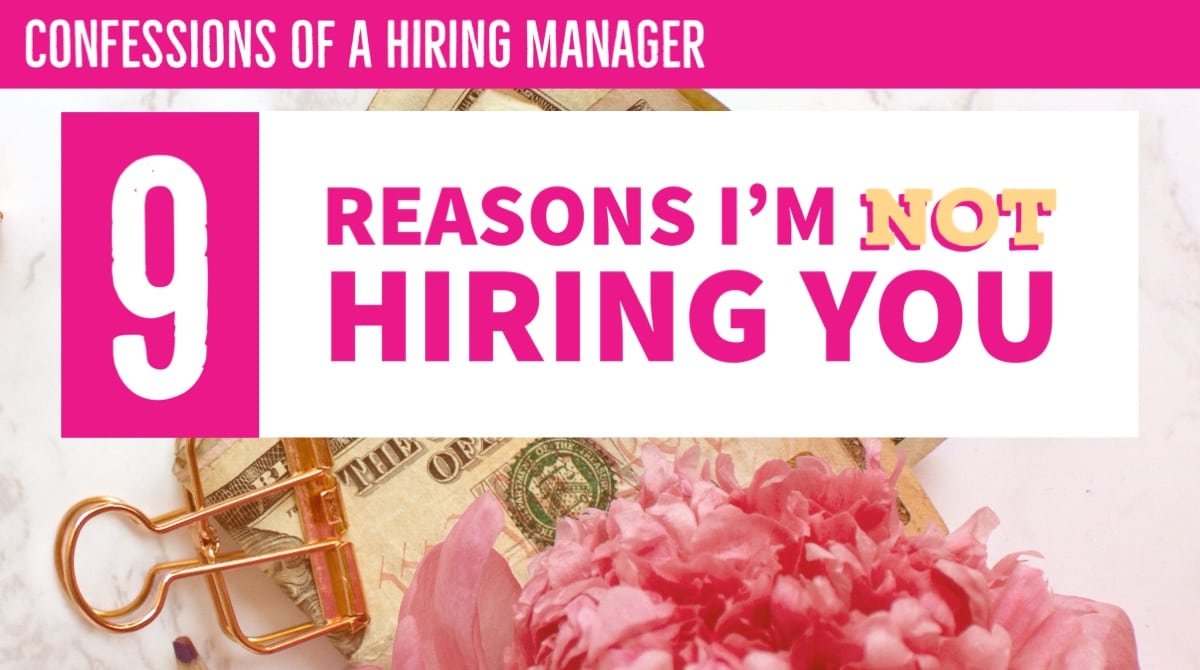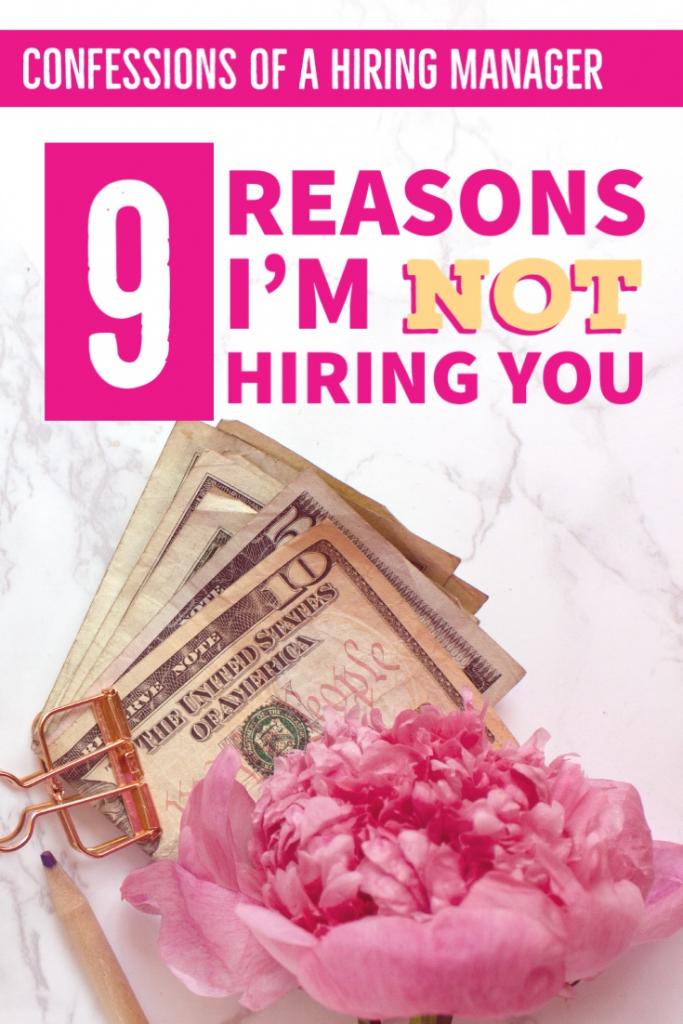
Have you ever wondered why you didn’t get a job that you thought was perfect for you? It’s easy to blame the employer for not giving you a fair chance, but the truth is, it might be your application materials or some other easy-to-fix thing that’s keeping you from your dream job.
Jarell and I are currently looking for a marketing intern for our parent company, Escape the Classroom. We love to hire interns because it makes us feel like we’re “giving back” for all of the help we’ve had along the way in our own careers. We know it is nearly impossible to break into most industries right out of college unless you have some sort of experience. So, we are happy to provide experience to students majoring in fields like education, marketing, graphic arts, and technology.
The problem is, a lot of intern applicants make giant mistakes that keep us from hiring them, and I don’t think they even know it—which is why I’m writing this probably-too-honest post. This list isn’t just for interns. If you’re having trouble getting a job, take a deep breath and ask yourself if you are guilty of any of these very correctible job application sins:
1. Your Application is Incomplete
The number one reason we don’t hire a job applicant is simply because their application is too incomplete for us to decipher who they are, what their experience is, or what they want to do. We know job applications are annoying, so we try to keep ours rather short, but we still have applicants who don’t answer the questions we pose.
We have no choice but to reject applicants who don’t bother to fill out the entire application. We look at every application with a compassionate spirit, but not all employers do. Most are going to take your unwillingness to complete the application as a sign that you don’t really want the job…and they won’t bother to call you for an interview.
No matter what, always complete the job application in its entirety. It’s the first impression for a lot of employers and you don’t want their first impression of you to be that you’re either uninterested in the job or you’re lazy.
2. Your Resume (or application) is Unprofessional
When we see short resumes for intern candidates, we understand that they don’t have a lot of experience and that’s why they’re coming to us for an internship. What we don’t understand is why they list “JV Cheerleader” as work experience on their resumes.
Here’s a quick list of unprofessional things we’ve seen on recent resumes and applications that you should change immediately:
- Parents or other family members listed as references
- High School clubs and awards listed as work-related accomplishments
- Traits like “punctual” and “hard worker” listed as skills
- Email addresses like “PookieBear92” or “SandysSister34”
- Missing contact information, like your phone number or mailing address
- Missing “professional profile” that starts the story of your resume
- Glaring typos and spelling errors (the obvious kind that elementary students would notice)
3. Your Resume Does Not Fit the Job Description
Employers don’t have a crystal ball. They can’t see how your skills and talents align for the job they advertised unless you show them.
You need to craft a customized resume for every job advertisement you answer. This means rewriting your professional profile at the top of your resume to include keywords from the job description, rewriting your job descriptions for previous jobs to show that you’ve done tasks that will transfer to the job for which you are applying, and rewriting your skills list to reflect the skills the job advertisement lists.
[bctt tweet=”If you’re applying for a web designer job, don’t turn in the same resume you used for a chicken fryer job at KFC. You may be qualified for both jobs, but you have to reframe your resume’s story to show an employer you’re the right person for the job.” via=”no”]
4. You Didn’t Include a Resume at All
One of the most disheartening things we see in job applications is when a job applicant doesn’t send us a resume at all. Instructional designers like our Escape the Classroom mottos of rebelliously smashing boring educational experiences, so they often fill out the contact form and tell us how much they’d love to work for us…but that’s it. They don’t include a resume or cover letter.
We always answer our emails. We answer these well-meaning educators and ask them for their resume, cover letter, and online portfolio. They never respond.
You need a resume. It’s your argument that you’re the right person for the job. You can’t apply for a job (outside of retail or food service) without one and expect to land an interview.
5. You Didn’t Include a Cover Letter
Probably 50% of the job applications we receive do not have cover letters included. It only takes a few minutes to craft a cover letter, so why would you avoid it?
The cover letter is your introduction. It tells an employer who you are and starts your argument as to why you are the perfect person for the job. Not writing one for each individual job tells the employer you aren’t serious about the job and don’t really care if you get it or not.
6. Your Cover Letter is Rude
Believe it or not, the only thing worse than not submitting a cover letter at all is submitting a rude one. When you try to bully an employer into hiring you or making a quick hiring decision, you are not going to get the job. No way. No how.
I say this because we have applicants send us cover letters that end with a statement like, “I have many other job offers, so I need to know right away if you plan to hire me.” No, I don’t plan to hire you.
This kind of statement tells the employer that you are high maintenance, conceited, and trouble. You might think it shows confidence, but it doesn’t. Employers want confident employees, but they also want kind employees that they can trust to make good decisions and impress clients with their diplomacy and helpful attitude.
As a female business owner, the last thing I want to do is hire someone that tries to bully me into it. It’s just not going to happen.
7. You Don’t have Work Samples
We don’t expect our interns to have full portfolios yet, and we give a lot of thought into assigning interns to projects they will be able to use to build solid portfolios so they have something to show future employers. However, if you are applying for a full-time or part-time job in any sort of art, design, writing, or technology-related industry, you must have work samples.
If you don’t have anything you can show, make something. In instructional design, I always want to see finished projects from potential designers so I can have a conversation with the designer about how they planned and built the project. It tells me a lot about whether or not the designer is a good fit for the kind of work we do, because not all instructional design is the same. We focus on high-end projects with a lot of media. Some designers were only trained to plan instruction in text-based format. Both are important types of instructional design, but the skill sets are very different.
The same is true with graphic design. Every artist has her own style, so employers want to see if the artist style matches their needs. Samples are key to this sort of job.
If you work in an industry that requires work samples, make sure you have them!
8. Your Reference Leaves You a Bad Review…or Doesn’t Know You at All
When you list someone as a reference, make sure you have their permission. Believe it or not, we have potential employees list references without telling the reference they plan to list them. So, we call the reference, and they tell us unflattering things about the job applicant. Even worse, some don’t remember the job candidate at all!
Your references are your allies in finding a job. When you list a reference, you’re telling the employer that this person has nice things to say about you. It’s absolutely tragic when your reference trashes you. There’s no coming back from that one—we simply aren’t going to hire you.
9. You Don’t Answer Your Email Regularly
If incomplete job applications are our number one reason we don’t hire someone, number two is when a job applicant doesn’t respond to our emails. Once we’ve chosen our interns, we always email them and confirm that they still want the job and then ask them to attend an information session with us. After the information session, we send them a contract to sign, which includes a start date. Amazingly, at least 1/3 of the potential interns we select never bother to reply to our emails.
If you want the job, monitor your communication channels. You should check your email no less than twice per day.
Related Posts
- Delete High School (and more) from your Resume
- 98% of Online Job Applications are Rejected; Don’t let yours be one of them!
- Intern to Jumpstart Your Career
- Ditch Your Resume’s Objective
Who am I Going to Hire?
This post may come across as negative, and it’s not meant to be that way at all. Everything I’ve listed in this post as a reason I don’t hire someone is completely fixable on the part of the job applicant. I will interview the job applicant that completes the application in its entirety, attaches a resume that shows he or she is the perfect person for the job, writes a lovely, friendly cover letter that explains why he or she wants the job is qualified for it, and answers my emails in less than 24 hours. Most employers feel the same way.
Save to Pinterest




Brittany Kilgore says:
Great tips! Just a heads up that your fifth point has a typo in the title.
Katie Evans says:
Thank you Brittany! Good catch. I fixed it.